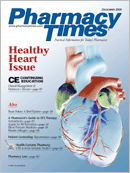Publication
Article
Pharmacy Times
A Pharmacist's Guide to OTC Therapy: Aspirin Regimen Therapy for Heart Attack Prevention
Author(s):
Each year more than 1.5 million individuals suffer from myocardial infarctions (MIs)?heart attacks?and approximately one third of those individuals die from MIs annually.1 Fortunately, many individuals at risk of having an MI may benefit from an aspirin regimen recommended by their physicians and thereby increase their chances of surviving an MI.
In 2002, the American Heart Association and the US Prevention Services Task Force presented recommendations encouraging physicians to consider aspirin therapy for the prevention of a first heart attack in patients at moderate or high risk. These patients included men over 40 and women over 50 years of age with other risk factors, such as hypercholesteremia, hypertension, diabetes, a history of smoking, or a familial history of cardiovascular disease.1
Benefits of Aspirin Use
The results of studies suggest that aspirin, taken regularly, under the supervision of a physician, has the following benefits2,3:
- Reduces the risk of first MIs by 32%
- Reduces the risk of second MIs by 20%
- Prevents incidence of death by up to 23%, if it is taken when a heart attack is suspected and continued for 30 days following the incident
The Role of the Pharmacist
Many different brands of aspirin products are available that specifically target the patient population that may require aspirin regimens for the prevention of MIs (Table). Because aspirin therapy is not appropriate for every patient, pharmacists can play a fundamental role in ensuring the proper usage of aspirin products by their patients. Pharmacists should assess the patients' concurrent medical and medication history to screen for possible contraindications and drug interactions, and aid patients in the proper selection of an aspirin product that suits their particular needs.
Pharmacists also should counsel patients thoroughly about potential adverse effects from using these products, as well as encouraging them to routinely follow up with their physician on the status of their condition. In addition, pharmacists can educate their patients on recognizing the warning signs of a heart attack, along with encouraging them to make necessary lifestyle changes to decrease modifiable risk factors.
For more information on aspirin regimen therapy, visit these Web sites:
- The American Heart Association Web site, www.americanheart.org
- Aspirin for Reducing Your Risk of Heart Attack and Stroke: KNOW THE FACTS, available at www.fda.gov/cder/consumerinfo/dailyaspirin_brochure.htm
Ms. Terrie is a clinical pharmacy writer based in the northern Virginia area.
For a list of references, send a stamped, self-addressed envelope to: References Department, Attn. A. Stahl, Pharmacy Times, 241 Forsgate Drive, Jamesburg, NJ 08831; or send an e-mail request to: [email protected].







